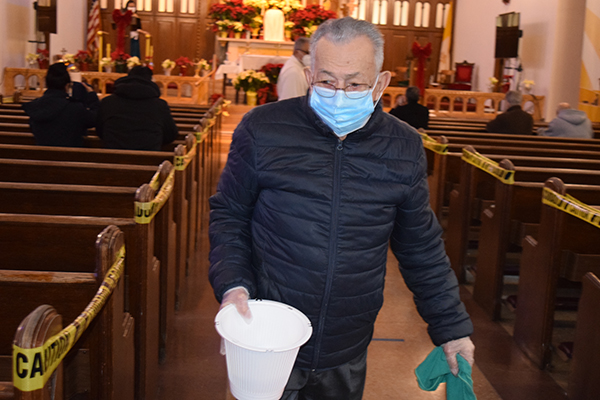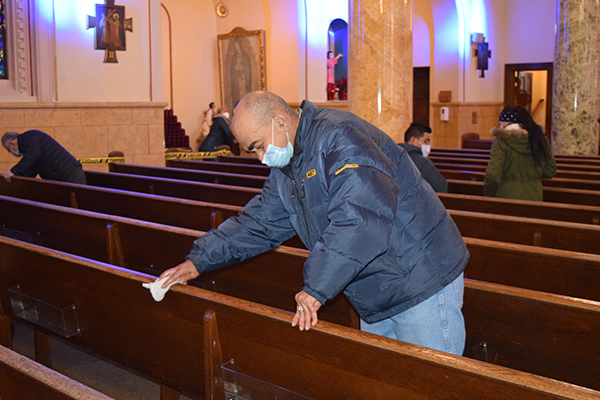
SUNSET PARK — Cleanliness is next to godliness, as the old saying goes.
At churches all over the Diocese of Brooklyn, parishioners take that famous adage seriously.
They help keep churches clean by dusting pews and railings, replenishing Holy Water fonts, picking up church bulletins left behind by parishioners, and performing other tasks out of a deep love for their parish.
While many churches in Brooklyn and Queens hire professional cleaning companies to wash floors and windows and tackle major cleaning projects, the parishioner-volunteers perform an essential task by supplementing the pros’ work, according to pastors.
On a recent Sunday, following the 9:15 a.m. Mass at St. Agatha Church, Sunset Park, Louis Cruz quietly went to work, painstakingly wiping down pews and then applying disinfectant to help try and reduce the spread of COVID-19.
“I want the church to be clean. I don’t want people to get sick,” he said.
On this particular Sunday, Cruz was part of a group of parishioners who cleaned the church.
“What they do is wonderful. And the devotion they have is inspiring. They do this all the time,” said Father Vincentius Do, pastor of St. Agatha Church.
Father Do said that volunteers work quickly after every Mass to tidy up before parishioners start streaming into the church for the next Mass. Each Mass has its own set of volunteers. The largest group comes to clean after the 10:30 a.m. Spanish-language Mass.
With the pandemic still raging, their work is even more crucial, he said. “We want people to know our church is clean,” Father Do said.

The phrase “cleanliness is next to godliness” was first uttered by British evangelist John Wesley in a sermon he delivered in 1778. It refers to the importance of humans to practice personal hygiene. But over the centuries, the phrase has come to be used in other ways, including references to house cleaning.
For Catholics looking for heavenly inspiration, St. Zita (1212-1272), who worked as a servant for a wealthy family in Tuscany, Italy in the 13th Century, is the patron saint of housekeepers and domestic servants.
COVID-19 has put a stop to church volunteers in many parishes. Over at St. Mel’s Church, Flushing, parishioner Madeline Bauer can’t wait for the pandemic to be over. “We want to get back to work cleaning the church,” she said.
Volunteer cleaners have been a part of St. Mel’s Church for decades, according to Bauer, a retired teacher. “It started a long time ago — long before I got involved. Msgr. McGuirl asked the Rosary Society to dust the church, and they started organizing the cleanups,” she said.
Msgr. John McGuirl served as administrator of St. Mel’s from 1989-1991 and as pastor from 1991-1995.
“It began in 1991. There were eight of us originally. We took turns. We enjoyed it,” said Carolyn Sitler, who was part of that first group of volunteers who answered Msgr. McGuirl’s call.
“We divided ourselves into teams. The ladies who cleaned and ironed the altar linens were called the Linen Ladies. The rest of us called ourselves the Church Ladies,” Sitler said.
Bauer got involved a few years after the cleanups began. “We used to go in there every Friday. We dust the pews, wash the Holy Water fonts, wash the glass doors, and do other things. We use Murphy’s Soap,” said Bauer, who started attending Mass at St. Mel’s Church as a newlywed in 1961.
The current group of volunteers gave themselves the nickname “Dust Busters.”
Before the pandemic, Bauer’s job was to set the cleaning teams’ schedule.
“Everybody is very dedicated. One man even brings his ladder. We work especially hard during Christmas and Easter. You want the church looking at its best then,” she said.
Father Joseph Fonti, pastor of St. Mel’s, marvels at his parishioners’ can-do attitude.
“I didn’t have to think. I didn’t have to ask. They just did it on their own,” he said.
Father Fonti described their sense of dedication as admirable.
“It shows a level of respect for the church,” he said. “They see the church as an extension of their homes.”
